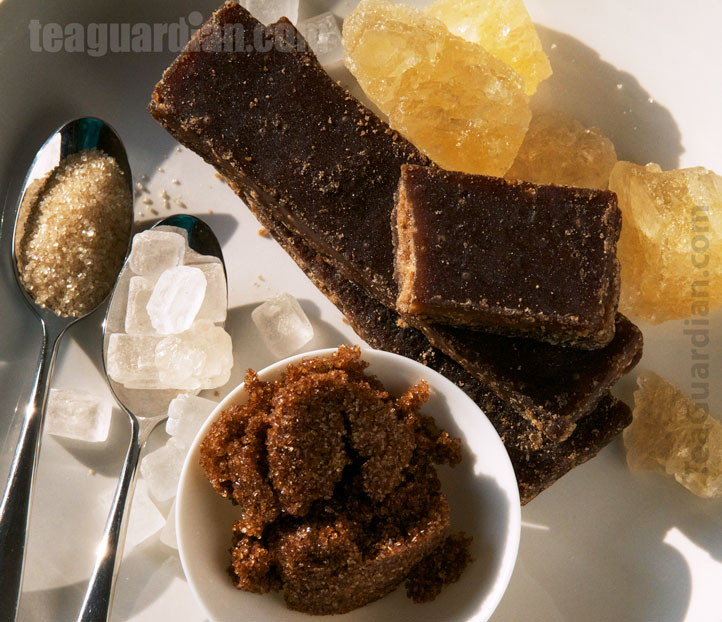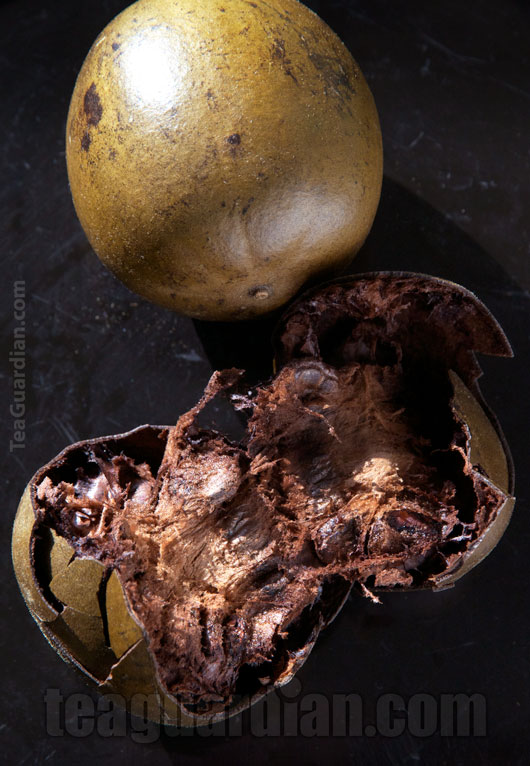Iced tea: Sweeteners and other ingredients
Although I have often advised against iced tea, an occasional glass of well prepared one is nevertheless a celebration of summer and its blazing sun, particularly when there is a party.
Since most people do not like plain iced tea, sweetening the tea is part of the routine. White sugar and corn syrup are commonly used, but it is a known fact that both are bad for your health. There are many reputable and reliable sources about this issue on the internet so I am not going to elaborate on it here. Instead, I shall list some healthier and better tasting sweetener alternatives and a few other herbal ingredients for a great cold tea drink.

Different types of sugar for sweetening tea ( counter-clockwise from centre bottom ): raw cane sugar, compressed raw cane sugar tablets; rock sugar; brown sugar and monocrystal sugar
Sweeteners
Single crystal sugar (aka Monocrystal sugar) is the best non-taste-intervening natural sweetener and the least bad aftertaste in all light colour cane sugars. Melt it in a little water to make a syrup. Don’t brown it.
Raw sugars and honeys add distinctive taste characters to the tea, and depending on the combination with tea choice, may or may not work well. To avoid clashing of taste characters, and if you definitely want a strong sweet, use a strong tea but that without very distinctive yet subtle character, and prepare it with ample strength.
Brown sugar is not much better than white sugar, since it is only a caramelised version of the thing.
Maple syrup also has its distinctive character, but I find it interesting used on roasted green teas and high fired oolongs.

Luo Han Guo, aka Monk fruit, latin name Siraitia grosvenorii, is a daily Chinese herb both in cooking and in traditional Chinese medicine formula. It is a powerful and healthy sweetener that has the potential for fighting diabetes, cholesterol, and cancer
Luo Han Guo ( Chinese: 羅漢果 ), aka Monk fruit (Siraitia grosvenorii) is the most pleasant sweetener, and very likely the healthiest one (3). If you care to prepare this yourself, it makes an excellent iced drink on its own, or infused with a touch of oolong.
Luo Han Guo itself is of “cooling” TCM nature so balancing it with a high fire oolong, such as a charcoal baked Tieguanyin or a Wuyi is a good idea. Paired it with Chinese liquorice ( Chinese: 甘草 ) if you don’t want to use tea in it.
Always buy a large, well dried one from a reputable Chinese herbal store. One fruit makes a very sweet 2 litre drink. Break the fruit into halves and soak it in a pot of cold water for 30 minutes before boiling it for 20 minutes on low fire. Chill it. Prepare a very strong tea separately. Dilute the strong tea liquor with the chilled sweet water before serving.
Support the growers, don’t buy extracts, derivatives or other products from pharmaceutical companies; buy only the real dried fruit. It stores well indefinitely and is so easy to prepare.
Fruits and Herbs
Lemon and lime (4) are actually better in Chinese green tea than black tea, though the latter is so much more popular. I personally recommend it with Huangshan Maofeng, the genuine well-baked version, or a past-year well roasted Longjing. Adding citrus fruits in iced tea “warms” (TCM term, not referring to the temperature) the “cold” character of iced tea for the stomach so this helps a little with the energy balance.
Ginger (5) is the best ingredient for an ice drink not only because of its pleasant taste and aroma, but also its TCM warm and “wind-driving” character that helps to dissipate the “dampness” of an iced drink. It is a strong taste though, but mixes well with roasted green, darker oolongs and black teas as cold drinks.

Dried peel of the mandarin orange is a staple herb and important ingredient in traditional Chinese medicine. When used in tea making, it helps to balance the chilling energy in iced tea to make it more friendly to human health
A ginger tea sweetens well with yellow rock sugar, or if you are advantageous enough, an additional drop of gin ( especially in Wuyi oolongs ) before serving.
Dried peel of mandarin orange ( aka chan pei, Chinese: 陳皮 ) helps to loosen up sticky mucus and balance a TCM “cold” drink. It is in fact a frequent ingredient in prescriptions for various ailments pertaining to the respiratory tract and those of weak digestion.
It also works well with ginger and lemon both for taste and for health effects. Soak it in cold water for 15 ~ 20 minutes and scrap off the inner white lining. Boil it for 15 minutes in the water for steeping the tea. If you want to be a little lazy, julienne it as thinly as possible and steep it together with the tealeaves. This lazy method is less effective in extracting the content of the herb, however.
Use a corner ( i.e. one-third of a whole, there are usually 3 corners in a whole ) at most for each liter of tea. It has its own strong taste.
Mint boiled with gunpowder green tea is the single most popular drink in Morocco, but they normally serve it hot, and with so much white sugar already cooked in it that it tastes more like a syrup.
Mint is available in the dried form in Chinese herbal shops and is also a frequent ingredient in prescriptions for complaints of the respiratory tract. Crush the dried leaves and infuse them together with the tealeaves.
Experiment, experiments, experiments
The most important thing for you to experiment is not only of the inexhaustible number of ingredients, but rather the proportion and combination of things. Taste really is a personal and cultural matter and if you ask me, there are hundreds of things that I can do with all these ingredients, and I have often enjoyed entertaining with a big jar of the result. On my own, however, I always prefer my little cup of freshly brewed hot tea, straight. No matter the season.










